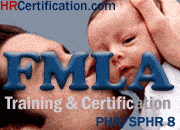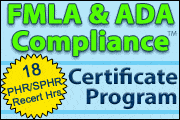HR Compliance Training Courses - FMLA, ADA, COBRA, And More
About Human Resources Compliance Training
HR compliance refers to ensuring your organization meets regulatory requirements across the employee lifecycle, from hiring practices to managing independent contractors. Ensuring HR compliance is critical to protecting your business, your employees, and your reputation. Navigating the complexities of employment laws, such as minimum wage, wage and hour laws, and the Equal Pay Act, can be daunting.

Compliance obligations such as adhering to workplace safety regulations under the Occupational Safety and Health Act (OSHA), following statutory compliance for overtime pay, and protecting against workplace harassment are essential.
With evolving expectations from government agencies and specific regulatory bodies, businesses in the private sector face constant compliance concerns. Whether it is maintaining a compliant workplace under the Civil Rights Act or managing identity and employment eligibility per immigration laws, staying ahead ensures your organization abides by local anti-discrimination laws, union law compliance, and transparency laws.
From FMLA to ADA to EEO to about 100 other HR compliance requirements, the HR Department must know - and comply with - a boatload of HR laws, rules, and regulations.
Key Responsibilities Of An HR Compliance Manager
Whether it be complying with federal or state laws like COBRA, FMLA, the ADA, and payroll, handling claims of discrimination and retaliation, or career planning for employees, an HR compliance manager is responsible for ensuring that an organization complies with all relevant laws, regulations, and policies related to human resources (HR) practices, including:
- Policy Development and Implementation:
Develop, update, and communicate HR policies and procedures to ensure compliance with federal, state, and local laws as well as industry standards. Implement these policies across the organization.
- Legal Compliance:
Stay updated on changes in employment laws and regulations at all levels of government. Interpret laws and regulations to ensure the organization's HR practices are in compliance. Advise management on compliance issues and recommend appropriate actions.
- Auditing and Monitoring:
Conduct regular audits and reviews of HR processes, practices, and documentation to identify areas of non-compliance and develop strategies for improvement. 
- Training and Education:
Provide training to HR staff, managers, and employees on compliance-related topics, such as sexual harassment prevention, diversity and inclusion, equal employment opportunity (EEO), and other relevant areas.
- Investigations:
Lead or assist in investigations of HR-related complaints or violations, including discrimination, harassment, retaliation, and other misconduct. Ensure thorough documentation and appropriate resolution of issues.
- Risk Management:
Identify potential areas of risk related to HR practices and develop strategies to mitigate those risks. This may include reviewing contracts, ensuring proper classification of employees, and managing employee relations issues.
- Recordkeeping and Reporting:
Maintain accurate records related to HR compliance, including employee files, training records, and compliance reports. Prepare and submit required reports to regulatory agencies as necessary.
Overall, the role of an HR compliance manager is critical in safeguarding the organization's reputation, minimizing legal risks, and fostering a workplace environment that is compliant, ethical, and conducive to employee well-being and productivity.
HR Compliance Training Courses - How To Achieve Compliance In HR
HR Training Center provides HR compliance training for COBRA, HIPAA, FMLA, ADA, Payroll, Retirement Plans, Cafeteria Plans, OSHA, and other federally-mandated compliance requirements, as well as HR compliance training for compensation, performance management, onboarding, time management, and virtually all HR required skills.
While a few of our best-sellers are listed below, you can see the full course listing be using the search box at the bottom of this page, or find your HR compliance training courses by using the links below.
HR Compliance Training Courses For Federal Laws
- FMLA Training & Certification Program
FMLA usage is on the rise, and more and more employees are enforcing their rights through the courts. When an employee misses work, it is the employer's responsibility to determine whether FMLA applies. You can't afford not to know the rules, so we'll teach you about how FMLA works! 
- ADA Training & Certification Program
Become ADA certified with our ADA Training &Certification Program! It covers compliance with your ADA requirements in detail, and provides suggestions for avoiding ADA violations. The Program also reviews how to integrate ADA compliance with other applicable laws, plus includes an exam to become ADA certified.
- COBRA Training & Certification Program
Understanding your organization's COBRA requirements can be challenging even for the most experienced professionals, especially because the Act comes with certain exceptions. Failing to comply with COBRA proves costly, so you need to follow the law exactly. Enrolling in a COBRA training program allows you to take control of your company's compliance!
- Cafeteria Plan Training & Certification Program
Our Section 125 Cafeteria Plan Training &Certification Program is loaded with information on plan design, administrative options, and compliance requirements, and is written in non-legal terms.
- 401(k) Training & Certification Program
Our 401(k) Plan Training & Certification Program is loaded with information on plan design, administrative options, and compliance requirements to help you provide 401k training for employees to help them understand the many and complex 401(k) rules.
- Certified Payroll Administrator
Payroll professionals must deal on a daily basis with wage and hour, garnishment, travel, expense, cafeteria plan, retirement plan, fringe benefit, PTO, and numerous other benefits and compliance issues - including the numerous reporting forms and requirements. Now you can get trained on these requirements, plus enhance your skills with our "Certified Payroll Administrator" designation!
Other HR Compliance Training Courses
Find Other HR Training Courses
Go to
https://hrtrainingcenter.com/coursetopics.asp to see the full list of our HR training courses.
Find Seminars, Webinars, And Online Training In Your Area
What Does An HR Compliance Manager Do? Identifying Key HR Compliance Issues
An HR Compliance Manager is a professional that keeps the legal and ethical integrity of a company intact through policy planning, communication, administration, and enforcement through all levels of the organization.
It is the HR Compliance Manager's job to advise, strategize, and implement policies and procedures to meet state and federal compliance requirements.
While the role of the HR Compliance Manager can be filled by a senior executive, for most organizations the majority of the actual work is done by an HR Compliance Specialist, aka an HR Generalist or an HR Specialist. For example, the HR Generalist or HR Specialist might handle the day-to-day FMLA, ADA, and COBRA administration, but report to a more-senior person who is responsible for both reviewing/approving their work and communicating and setting policies at an executive level.
Common HR Compliance Issues And Responsibilities
Managing your HR compliance generally includes being responsible for:

- Knowing the applicable state and federal laws and regulations
- Having correct hiring and firing processes
- Job Descriptions
- Employee Handbooks
- Responding to claims of theft, harassment, retaliation, etc...
- Investigating potential fraud and abuse
- Training, for both your HR compliance staff and keeping up with regulatory changes
- Proper documentation and recordkeeping policies and procedures
- Auditing and updating your organization's HR compliance policies
Benefits Of Human Resources Training Courses
Individuals take human resources (HR) courses for various reasons, including:
- Career Change or Entry Into HR:
Individuals from diverse educational backgrounds or career paths may take HR courses as a stepping stone to enter the HR profession or facilitate a career change into HR.
- Career Advancement:
Many individuals pursue HR courses to enhance their skills and knowledge in the field, thereby increasing their chances of career advancement or transitioning into HR roles.
- Professional Development:
HR courses offer opportunities for professional development, allowing individuals to stay updated on industry trends, best practices, and evolving regulations.
- Compliance and Legal Knowledge:
HR courses often cover employment laws, regulations, and compliance requirements, which are essential for HR professionals to ensure organizational compliance and mitigate legal risks.
- Business Acumen:
Understanding the business side of HR is crucial for effectively aligning HR strategies with organizational goals and objectives. HR courses may include topics related to strategic HR management, workforce planning, and HR analytics.
- Specialization:
HR encompasses various specialties such as recruitment, employee relations, compensation and benefits, training and development, and HR management. Taking courses in these areas allows individuals to specialize and become experts in specific aspects of HR.
- Personal Interest:
Some individuals may have a personal interest in human resources and choose to take HR courses out of curiosity or a desire to learn more about topics such as organizational behavior, talent management, or workplace diversity.
- Entrepreneurship:
Individuals starting their own businesses or working in small businesses may take HR courses to learn how to effectively manage human resources within their organizations, including hiring, managing performance, and compliance with employment laws.
- Networking Opportunities:
HR courses provide opportunities to network with peers, industry professionals, and instructors, which can be valuable for career growth, job opportunities, and knowledge sharing.
Overall, individuals take HR courses to develop their skills, knowledge, and expertise in human resources, whether for career advancement, professional development, compliance purposes, or personal interest.


 770-410-1219
770-410-1219










